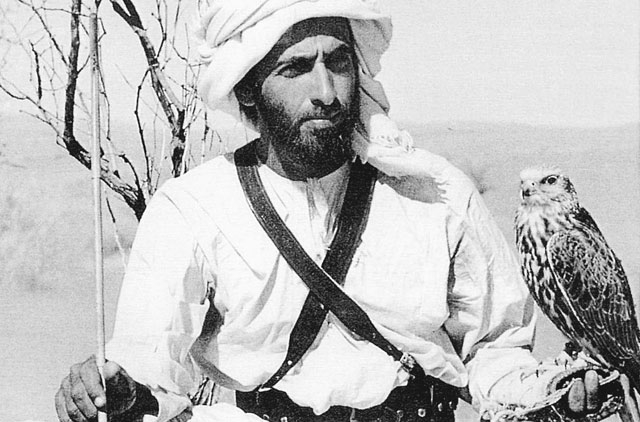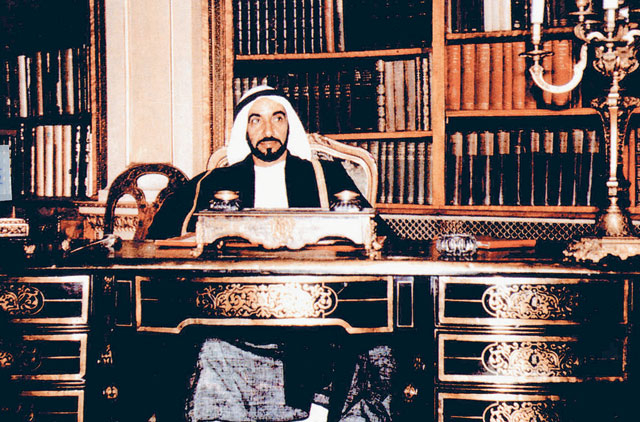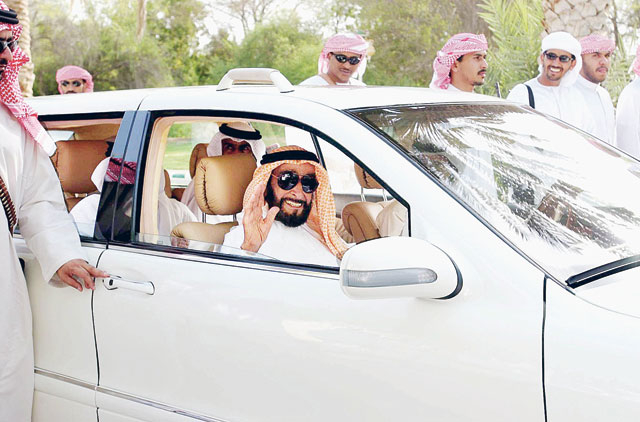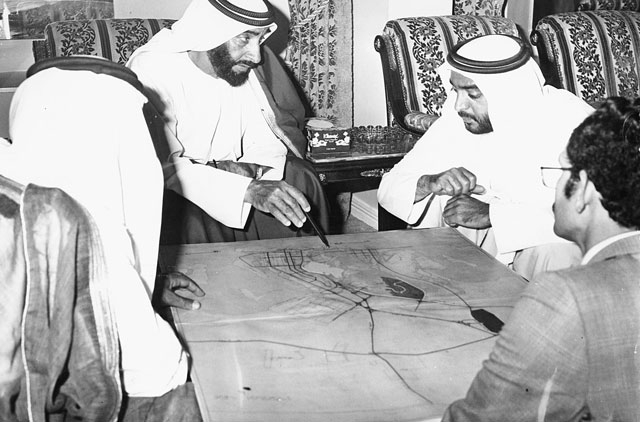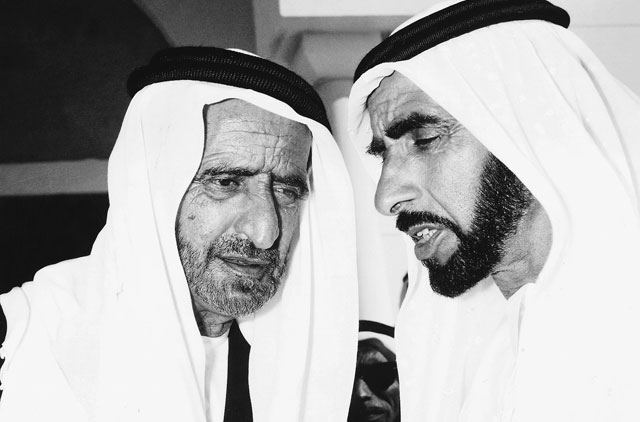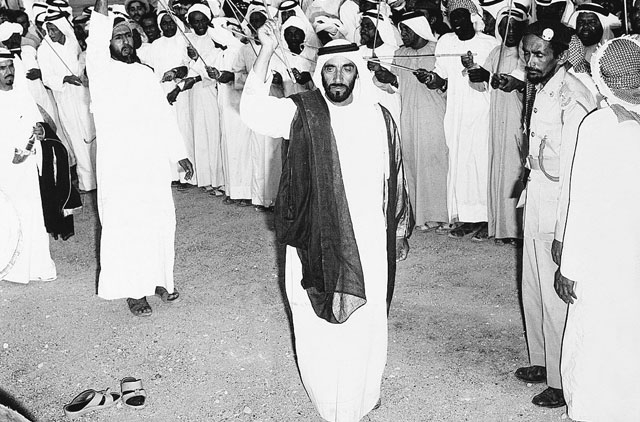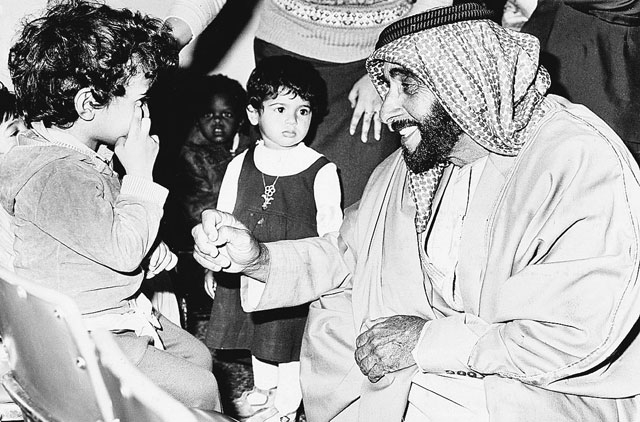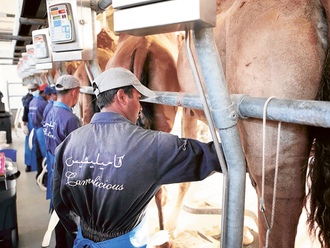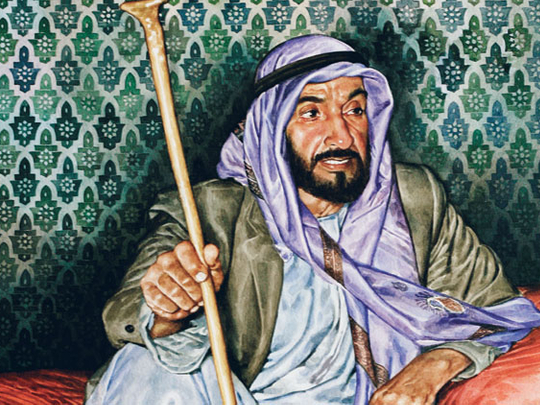
Shaikh Zayed Bin Sultan Al Nahyan was an honourable man who earned widespread respect, as he became a great leader, relying on his impeccable faith and legendary intuition. A first assessment of his significant contributions to Emirati, Arab, Muslim and international affairs must be his conscious efforts to transform a backwater hamlet into a vibrant country, which stood for justice, generosity and the culture of life. Remembered as "the man who turned the desert green", the humble Shaikh Zayed embarked on a massive forestation scheme (more than 250 million trees planted since 1972 and counting) that literally converted some of the region's harsh desert environments into pockets of greenness.
Although the Al Nahyans ruled Abu Dhabi for at least two centuries as leaders of the Al Bu Falah clan, one of the pre-eminent sub-groups within the Bani Yas tribal confederation, it was Shaikh Zayed who accomplished sensational feats. Above all else, and long before oil ushered in financial wealth, Shaikh Zayed valued human capital. He once queried this writer on the changes observed in the federation, intrigued by, and happy to hear, comments that shed light on the progress within Emiratis. What interested him most were human advancements. It may be fair, therefore, to assert that this truly impressive man held the view that opportunities bestowed on the UAE should not, indeed could not, be wasted.
Tribal schooling
Of all the skills Shaikh Zayed harnessed, none served him as well as his capacity to master the arts of shurah (consultation) and tawassut (mediation), over intra-tribal clashes, which he satisfactorily resolved. These proficiencies, noted Wilfred Thesiger, the English travel writer who crossed the Rubh Al Khali desert and who knew Shaikh Zayed well, allowed him to circulate where few could, because he earned everyone's trust. "Shaikh Zayed was a powerfully built man of about 30 with a brown beard," wrote Thesiger in his Arabian Sands. He "had a strong, intelligent face, with steady, observant eyes and his manner was quiet but masterful ... [Shaikh Zayed] had a great reputation among the Bedu", opined the shrewd Englishman.
This standing expanded over the years and, when London announced that British forces would leave the Gulf by 1971, Shaikh Zayed spearheaded a plan to unite the nine major emirates that fell under British suzerainty. In the event, Bahrain and Qatar went their separate ways, but Shaikh Zayed managed to unite the seven remaining emirates.
The UAE federation
The 1968-1971 period was probably one of the most difficult in Shaikh Zayed's distinguished career, as he cajoled, persuaded, withdrew, forgave and promoted the creation of a federation that became the UAE on December 2, 1971. Shaikh Zayed was saddened to hear experts doubting the nascent country's very survival beyond a few months or years. Few thought that this experiment would succeed, allegedly because internal and regional rivalries were so acute that they would tear the nascent state apart.
In hindsight, not only has the federation survived and prospered, it also attained heretofore unheard of levels of stability and prosperity, in large part due to Shaikh Zayed's policies that, in coordination with those of the late Shaikh Rashid Bin Saeed Al Maktoum of Dubai, sealed the peace pact among cousins. Naysayers, who seldom stepped back to reassess their limited analytical prowess, were proven wrong.
Shaikh Zayed was elected president of the UAE in 1971 for a five-year term, a function that was bestowed on his broad shoulders during six consecutive elections, the last one being in 2001. Immensely skilled, the emancipated ruler did not shy away from Emirati disputes with Iran, Oman and Saudi Arabia. In each instance, whether the issues dealt with territorial claims or actual occupation, Shaikh Zayed utilised his authority effectively. Throughout many acrimonious debates, he knew how to protect the UAE's national interests, conceding when necessary but never compromising on the country's territorial integrity or the stability of its institutions. A consummate negotiator who understood the values of both reticence and conciliation, Shaikh Zayed was moved by an absolute sense of justice as he understood that internal reconciliation required sharing the country's wealth with those less fortunate. For him, capital was a mere commodity that needed to be distributed, because it was nothing more than providential trust.
If the privileged practiced greed, he reasoned, destiny would silence the stingy and exuberance would be replaced by catastrophe and poverty. This was not akin to superficial claims of divine privilege but of fiduciary responsibilities that necessitated careful husbanding of scarce resources — and Shaikh Zayed truly believed in his lucky stars.
For three decades, the bright ruler painstakingly invested in the UAE, which witnessed the creation of major institutions ranging from ministries of finance, planning, defence, communications, internal and foreign affairs, as well as health, education and the judiciary. Shaikh Zayed financed large-scale construction of public housing facilities, schools and hospitals, where few existed both in Abu Dhabi and throughout the federation. The capital city's airport, which was little more than a dirt strip, was upgraded into an international facility, along with a modern seaport, highways, roads and bridges linking the island to the mainland. The end result was an advanced country, with elegant fittings, all immersed in lush gardens. Inspired by this founding father, Emirati officials in Dubai, Sharjah, Ras Al Khaimah, Ajman, Umm Al Quwain and Fujairah, all embarked on grandiose economic schemes that changed the face of the country. While many toiled to introduce these dramatic modifications, Shaikh Zayed inspired most, and acted as the paradigm worthy of emulation.
It must be emphasised that Shaikh Zayed's politics of magnanimity and generosity were unrivalled. He even yielded parity to Dubai, even if Abu Dhabi could have prospered standing alone, for his commitment to the federation was unprecedented.
For years, Abu Dhabi provided the vast bulk of financing for all federal projects, and by 2000, assumed in toto the heavy defence burden for all. The commander-in-chief made political concessions as well, displaying a deft mastery of genealogical politics, appointing cadet members of the family or the sons of other emirates' rulers, to critical federal positions. In Abu Dhabi, for example, the more numerous Bani Khalifah, grandsons of one of the brothers of Shaikh Zayed's father who entertained claims to rule, were entrusted positions of authority too. In Dubai, he appointed a young Shaikh Mohammad Bin Rashid as Minister of Defence (a position still in effect), while Mubarak Bin Mohammad Al Nahyan became Minister of Interior (whose sons Nahyan and Hamdan were also entrusted with critical posts). Many others became well-paid advisers. The astute Shaikh Zayed shared the perquisites of power and provided most of these junior officials generous stipends in what can only be described as a full-fledged creation of wealth operation.
Foreign assistance
The ruler's generosity was also duplicated elsewhere. Because Abu Dhabi was the beneficiary of Kuwaiti financial assistance in the 1950s and 1960s, Shaikh Zayed emulated the shaikhdom's paradigm by establishing the Abu Dhabi Fund for Arab Economic Development (ADFAED), which channelled a portion of oil windfall to more than 50 less fortunate Muslim countries in Asia and Africa.
ADFAED investments enhanced the country's involvement in inter-Arab affairs, using the UAE's wealth to promote stability and moderation. Naturally, his greatest concerns focused on proximate threats as he carried out several mediation efforts between Oman and the People's Democratic Republic of Yemen and, after the latter merged with the Yemen Arab Republic in 1990, between Aden and Riyadh too. Throughout, Shaikh Zayed mixed political savvy with close attention to development needs, providing significant assistance to those in need.
The question of Palestine
Shaikh Zayed's major foreign policy preoccupation was the question of Palestine. A proud die-hard Arab nationalist who expressed his views as clearly as anyone on the core Arab concern, the absorbed ruler was seriously troubled by the incalculable Palestinian sufferings under Israeli occupation. He repeatedly pleaded with fellow Arab and world powers to assist in a fair and equitable solution.
In fact, if Abu Dhabi's financial reserves were somewhat modest in the early 1970s, it was because Shaikh Zayed disbursed a sizeable portion — hundreds of millions of dollars — to Arab confrontation states facing Israel. During the 1973 October War, Shaikh Zayed backed King Faisal Bin Abdul Aziz, as the latter pledged considerable financial contributions to both Egypt and Syria.
He also supported the Saudi monarch's decision to impose an embargo on oil sales to the United States and the Netherlands after Richard Nixon authorised a massive military transfer to Israel.
Shaikh Zayed was dismayed that a great power like the United States, founded on the principles of freedom and justice, would be so discriminatory against the weak and hapless Palestinian population.
Much like his support for the core Arab concern, Shaikh Zayed displayed an immensely tolerant penchant towards Christians, Hindus and people of other faiths, aware that the presence of a very large expatriate community in the UAE necessitated flexibility. This faithful man did not wear his religion on his sleeve. Faith was not simply a matter of convenience but also of conviction, as Shaikh Zayed distinguished Abu Dhabi from neighbouring societies, with full freedom of religion. In fact, it was this quality that earned Shaikh Zayed global respect.
Perhaps the best illustration of this preference was the late president's policies towards Iran, especially after the 1979 Islamic Revolution, which highlighted the Gulf that separated Sunnis from Shiites. To his credit, Shaikh Zayed bridged the gap, as he advocated dialogue to settle disputes even if he remained adamant that Tehran acknowledge the UAE's sovereignty over the three strategic islands of Abu Mousa, Greater Tunb and Lesser Tunb, occupied by Iran in 1971. It was Shaikh Zayed's wish that these claims be settled through peaceful methods, cognizant that diplomatic initiatives were preferable to confrontation, especially among neighbouring countries.
Remarkably, Shaikh Zayed espoused a moderate Muslim conservatism, as he himself rejected extremism. Although he supported Muslim centres of learning that promoted religious education, Shaikh Zayed rejected excessive judgments rendered by the Sharia courts and, using his presidential powers granted by the UAE Constitution, regularly set aside decisions that were deemed harsh.
Legacy
Shaikh Zayed Bin Sultan Al Nahyan was a globally respected elder Arab statesman who was actively engaged in a range of issues and concerns. International observers noted that Shaikh Zayed was a man in a hurry, anxious to introduce fundamental reforms to his nation-state, willing to pay any price and assume any burden as long as these advanced the status and condition of the average Emirati. Unlike many who rolled in wealth, he lived a relatively modest life, always attuned to his basic traditions and values. At ease in his beloved desert, Shaikh Zayed would spend many hours contemplating sunsets over the horizon, comfortable in a familiar environment that nurtured and sustained him.
The true legacy of Shaikh Zayed was not just in channelling wealth and investing in building a modern El Dorado. It was in bringing the federation to life under extremely difficult circumstances and against great odds.
He earned the reputation of a trustworthy Arab statesman, played a fundamental role in defusing and resolving regional disputes and, more important, promoted moderation. His lasting and weighty imprint will inspire generations who may find solace in his character as they aspire to greatness.
A devoted ruler
Shaikh Zayed Bin Sultan Al Nahyan, who passed away on November 2, 2004, was probably born towards the end of the First World War in Abu Dhabi, the son of Sultan Bin Zayed Al Nahyan and grandson of Zayed the Great, a master sovereign who ruled for nearly 50 years and became the dominant political figure throughout the lower Gulf region. Shaikh Zayed received a traditional education, which meant exposure to the Quran and to a limited window of Arab literature. Early on, as he grew up in the Al Ain Oasis, he demonstrated a keen interest in tribal affairs, which helped him develop a sharp awareness of his own family's key position in the area.
A courageous warrior, his physical endurance enhanced his reputation, which proved essential as he assumed the Al Ain province governorship in 1946, a position he retained until August 6, 1966, when he succeeded his brother Shakhbut Bin Sultan as ruler in a bloodless palace coup.
With the discovery of oil in Abu Dhabi in 1958, Shaikh Zayed quickly appreciated the rare opportunity, as he decided to harness and unleash this new source of power. He skillfully negotiated the creation of the UAE and quickly ‘invested' in an unprecedented infrastructure where little existed before. An unparalleled generosity, which has seldom been duplicated, distinguished Shaikh Zayed who handed out oil revenues to his people and, more recently, through the massive Khalifa Fund that allocates real estate holdings and medical assistance. Shaikh Zayed was appointed president of the federation in 1971 and, over the years, saw his five-year mandates extended by the other six UAE rulers. A faithful man, this relatively liberal ruler believed in basic freedoms for all, as he relied on a huge expatriate population to toil in building up the UAE.
Shaikh Zayed died on November 2, 2004, in Abu Dhabi after a long illness and was succeeded by his eldest son, Shaikh Khalifa Bin Zayed Al Nahyan, born in 1947, who was the heir apparent of Abu Dhabi and Deputy Supreme Commander of the UAE Armed Forces.
Dr Joseph A. Kéchichian is an author, most recently of Faysal: Saudi Arabia's King for All Seasons (2008).


